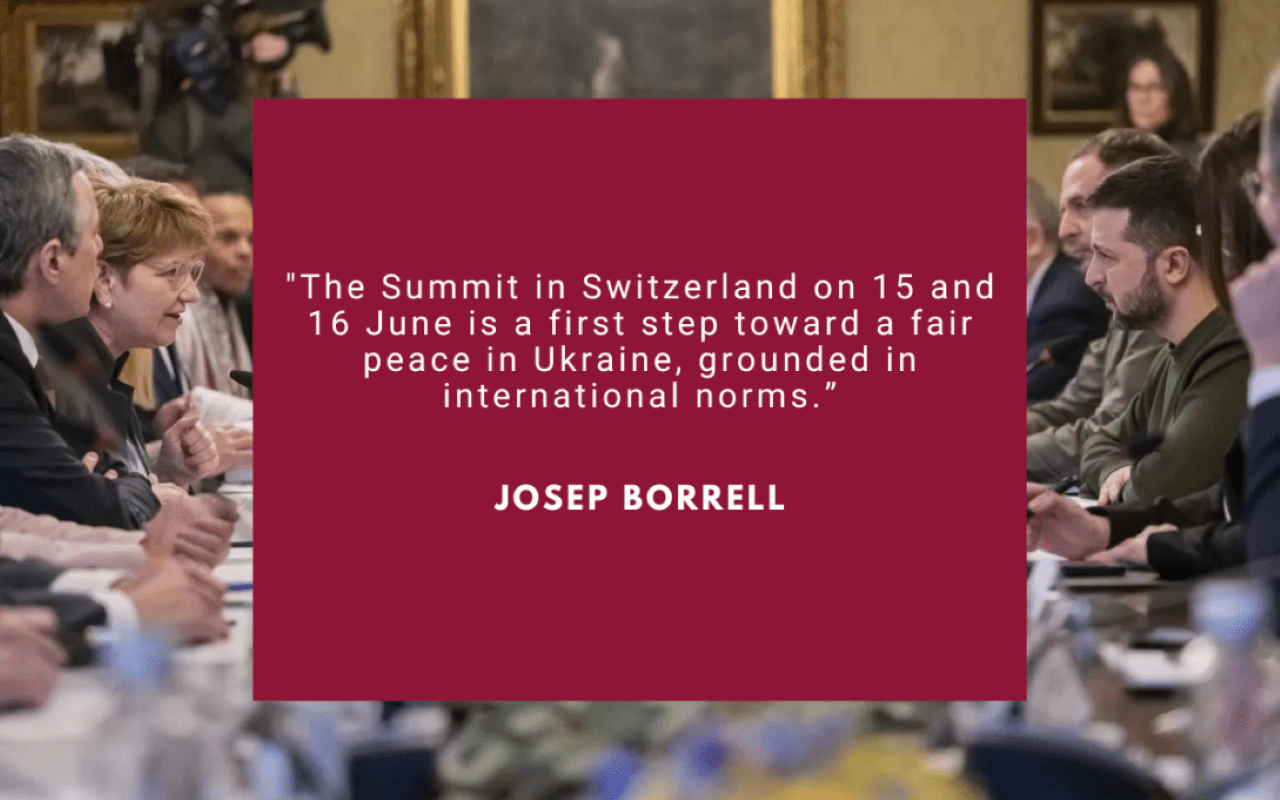Brussels, 12 June 2024
The Summit on Peace organised by Switzerland will bring together almost 100 nations from all parts of the globe to discuss how to initiate a process to end the war against Ukraine. The EU fully supports these efforts. No one desires peace more than the Ukrainian people, but lasting peace can only be achieved if it is grounded in the core principles of the UN Charter.
This weekend, I will attend the Summit on Peace in Ukraine in Switzerland. It is not a platform for direct negotiations between Ukraine and Russia. This Summit rather aims to develop among the participating countries common parameters for peace, grounded in international law and the UN Charter.
The Summit will also focus on selected practical issues on which to engage Russia: how to enhance nuclear security, facilitate the exchange of captives and ensure the return of the many thousands of Ukrainian children abducted to Russia, a practice that harks back to darker periods of European history. It will also focus on ensuring free navigation and protecting Black Sea port infrastructure. The impact of the war of aggression against Ukraine extends far beyond its borders. A protracted or frozen conflict would perpetuate instability and threaten global food security and economic stability. Progress in these areas could open avenues for engagement with Russia in other areas over time.
This war and its outcome are existential for Ukraine, but also for European security. Any ceasefire that would allow Russia to keep its repressive regime in occupied territories would reward this aggression, undermine international law and encourage further territorial expansion by Russia. Every UN report since 2022 provides ample evidence of the brutal repression of Ukrainians and the systematic human rights violations in occupied Ukraine.
Russia is fighting an unprovoked war of choice, driven by imperial ambition, while Ukraine is fighting a war of necessity, defending its very right to exist.
No one desires peace more than the Ukrainians. However, the right conditions for peace matter for Ukraine and for the world. Russia is fighting an unprovoked war of choice, driven by imperial ambition, while Ukraine is fighting a war of necessity, defending its very right to exist. As Vladimir Putin said again in Saint Petersburg a few days ago, he pursues full victory on the battlefield and sees no urgency to end the war. Only a few weeks ago, he launched a new offensive against Kharkiv. His missiles have largely destroyed Ukraine’s energy infrastructure and continue to kill Ukrainian civilians every day.
Meanwhile, his envoys tour the world to discourage countries from engaging in the Summit for Peace. Russia is obviously not ready to engage in good faith negotiations and would use any ceasefire to rearm and attack again. Russia’s narratives around peace are merely disguised attempts to legitimise its war of territorial conquest.
Consequently, Russia’s declaration that it would not attend the Swiss summit, even if invited, did not come as a surprise. However, the participation of close to 100 countries and organizations, from Asia, the Middle East, Africa, and Latin America, indicates robust international support to end the war on the basis of the UN Charter. This is crucial to reassure Ukraine, the victim of Russia’s war of aggression, ahead of any possible engagement with Russia.
The participation of close to 100 countries and organizations, from Asia, the Middle East, Africa, and Latin America, indicates robust international support to end the war on the basis of the UN Charter.
Other proposals will also be discussed at the Summit, but we believe that Ukraine’s 10-point peace formula remains the most credible basis for future peace negotiations. Proposals that do not reference the UN Charter and ignore Ukraine’s political sovereignty, territorial integrity and right to self-defence would amount to rewarding the aggressor and legitimising Russia’s attempts to redraw borders by force. Such proposals cannot bring lasting peace. In this regard, the absence of China in Switzerland and its outreach to discourage participation do not strengthen China’s claims of neutrality.
The EU wants peace in Ukraine. A diplomatic solution that respects international norms would have the backing of all EU Member States. At the same time, we must continue to match our diplomatic efforts with military support, in line with Ukraine’s inherent right to self-defence as per article 51 of the UN Charter. Given that Putin shows no intention to negotiate in good faith, Europe’s continued military support to Ukraine remains just as crucial to peace in Ukraine as our support for a diplomatic track.
Yes, wars generally tend to end with a peace agreement, but the content of this peace agreement is crucial to European and global security, and the international rules-based order. Let’s make the Summit on Peace in Switzerland a first step to a fair, UN Charter-based peace in Ukraine.

